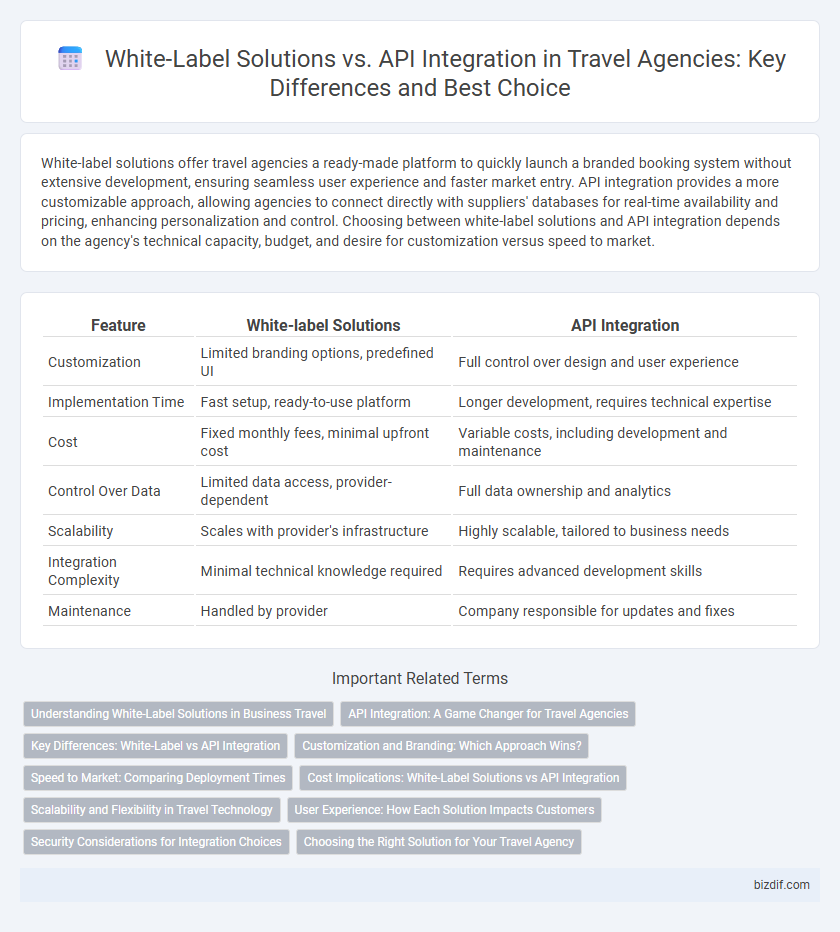White-label solutions offer travel agencies a ready-made platform to quickly launch a branded booking system without extensive development, ensuring seamless user experience and faster market entry. API integration provides a more customizable approach, allowing agencies to connect directly with suppliers' databases for real-time availability and pricing, enhancing personalization and control. Choosing between white-label solutions and API integration depends on the agency's technical capacity, budget, and desire for customization versus speed to market.
Table of Comparison
| Feature | White-label Solutions | API Integration |
|---|---|---|
| Customization | Limited branding options, predefined UI | Full control over design and user experience |
| Implementation Time | Fast setup, ready-to-use platform | Longer development, requires technical expertise |
| Cost | Fixed monthly fees, minimal upfront cost | Variable costs, including development and maintenance |
| Control Over Data | Limited data access, provider-dependent | Full data ownership and analytics |
| Scalability | Scales with provider's infrastructure | Highly scalable, tailored to business needs |
| Integration Complexity | Minimal technical knowledge required | Requires advanced development skills |
| Maintenance | Handled by provider | Company responsible for updates and fixes |
Understanding White-Label Solutions in Business Travel
White-label solutions in business travel allow agencies to offer customized booking platforms branded under their own name without the complexity of developing technology from scratch. These solutions provide seamless access to global travel inventories, enabling efficient management of flights, hotels, and car rentals while maintaining a cohesive customer experience. Unlike API integration, which requires technical resources to build and maintain direct connections with multiple suppliers, white-label platforms offer a turnkey approach with minimal IT involvement and faster deployment.
API Integration: A Game Changer for Travel Agencies
API integration streamlines access to diverse travel inventories, enabling agencies to offer real-time pricing, availability, and instant bookings across flights, hotels, and car rentals. This seamless connection enhances user experience while reducing manual workload and errors, boosting operational efficiency. Advanced APIs also support dynamic packaging and personalized offers, driving higher conversion rates and customer satisfaction for travel agencies.
Key Differences: White-Label vs API Integration
White-label solutions offer fully branded, turnkey platforms that travel agencies can quickly launch, providing seamless user experiences without extensive technical development. API integration enables deeper customization and control by directly connecting with travel suppliers' databases and services, allowing agencies to build unique interfaces and workflows. While white-label platforms prioritize speed and ease of deployment, API integration focuses on flexibility and scalability for more tailored travel solutions.
Customization and Branding: Which Approach Wins?
White-label solutions offer extensive customization and branding opportunities by allowing travel agencies to fully rebrand the platform, ensuring a seamless customer experience aligned with their identity. API integration provides flexibility through direct access to supplier inventory but requires advanced technical skills to tailor branding elements effectively. For agencies prioritizing a cohesive and easily maintainable branded interface, white-label solutions typically outperform API integration in customization and brand consistency.
Speed to Market: Comparing Deployment Times
White-label solutions offer rapid deployment with minimal customization, enabling travel agencies to launch branded platforms within days or weeks. API integration requires more development time and technical resources, often extending time to market to several months due to complex backend integrations. Choosing white-label solutions accelerates speed to market, while API integration provides greater flexibility at the cost of longer setup periods.
Cost Implications: White-Label Solutions vs API Integration
White-label solutions typically involve fixed subscription fees and lower upfront costs, making them cost-effective for small travel agencies with limited budgets. API integration, while requiring higher initial development and maintenance expenses, offers greater customization and scalability, benefiting larger agencies with complex requirements. Evaluating the total cost of ownership, including ongoing support and upgrade fees, is crucial when choosing between white-label solutions and API integration for travel service offerings.
Scalability and Flexibility in Travel Technology
White-label solutions offer travel agencies a ready-made scalable platform that can be quickly branded and deployed without extensive technical expertise. API integration provides greater flexibility by enabling agencies to customize and combine multiple travel services such as flights, hotels, and car rentals while scaling operations based on real-time demand. Choosing between white-label and API solutions depends on prioritizing rapid scalability versus tailored flexibility within the travel technology ecosystem.
User Experience: How Each Solution Impacts Customers
White-label solutions provide a seamless, branded booking experience that enhances customer trust and loyalty by maintaining consistent design and functionality across the platform. API integration offers more flexibility and access to diverse travel inventories but may introduce inconsistent user interfaces, potentially confusing customers. Optimizing user experience requires balancing the control of white-label solutions with the extensibility of APIs to meet customer expectations efficiently.
Security Considerations for Integration Choices
White-label travel solutions provide a secured, turnkey platform with built-in compliance and data protection, minimizing the risk exposure for agencies by handling user data within a controlled environment. API integration offers greater customization but requires robust security measures such as encrypted data transmission, regular vulnerability assessments, and strict access controls to safeguard customer information. Travel agencies must evaluate these security considerations carefully to ensure that the chosen integration method aligns with their risk tolerance and regulatory requirements.
Choosing the Right Solution for Your Travel Agency
White-label solutions offer travel agencies a fully branded, ready-made platform that simplifies deployment and requires minimal technical expertise, ideal for quick market entry. API integration provides greater customization and control over features, enabling agencies to tailor offerings and enhance customer experience but demands more development resources. Assess your agency's technical capacity, budget, and desired level of customization to choose the most efficient solution for scaling your travel business.
White-label solutions vs API integration Infographic

 bizdif.com
bizdif.com